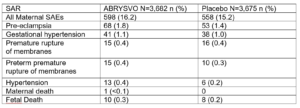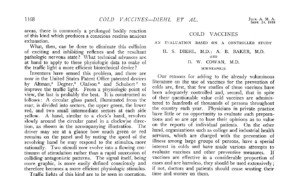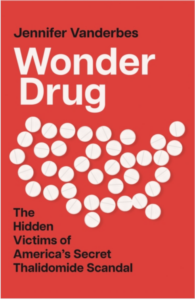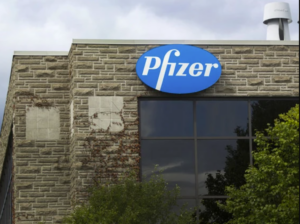
Pfizer’s maternal RSV vaccine (RSVpreF aka Abrysvo) has now been approved by both FDA and EMA. In the USA recommendations are awaited from CDC, ACIP and ACOG.
Previous posts have examined Abrysvo’s risks if given to pregnant women. See:
American drug Labels (called Package Inserts elsewhere) are printed documents that inform the prescriber about the product. For prescription drugs and medical devices, FDA enforces the provisions of the 1966 Fair Packaging and Labeling Act, which requires all consumer products to be honestly and informatively labelled. US Labels are designed to inform doctors, Patient Package Inserts inform patients.
Labels and Inserts are written by companies. FDA rubber stamps them. The approved Abrysvo Label is here along with Product Insert and Regulatory History here
We don’t need no educashun
Pfizer however want you to learn that the most common side effects reported by pregnant women on Abrysvo were pain at the injection site, headache, muscle pain and nausea. And
“Although not as commonly reported, a dangerous hypertensive disorder, known as pre-eclampsia, occurred in 1.8% of women getting Abrysvo compared to 1.4% of women getting placebo. Low birth weight and jaundice occurred at a higher rate in the infants born to women getting Abrysvo compared to placebo.”
The Prescribing Information mentions a numerical imbalance in preterm births on Abrysvo (5.7%) compared to placebo (4.7%). The data, we are told, are insufficient to establish or exclude a causal relationship between preterm birth and Abrysvo.
Table 3. Select Pregnancy-related Serious Adverse Events (SAR) in Pregnant Individuals Occurring at any Time Following Vaccination

The numbers in this table are concerning. It is statistical illiteracy to appeal to “confidence intervals” to claim there is no problem here.
What you are not told is that pregnant women who were at increased risk of preterm birth were excluded from the Abrysvo trials. Nor told that Arexvy, GSK’s almost identical vaccine – the two companies are suing each other over alleged patent infringements – had a very clear excess of preterm births and neonatal deaths. So much so that GSK abandoned their trial.
The wording of the Label informs doctors that to avoid the potential risk of preterm birth before 32 weeks of gestation, they should give Abrysvo between 32- and 36-weeks. Gosh.
This raises several issues.
- How can the risk of preterm birth after 32 weeks be minimised?
- Should a woman with a history of a previous preterm birth be vaccinated? There are
no data on this group of people because they were excluded from Pfizer’s RSV trials. - How much of the data about preterm birth imbalances and maternal adverse events
should be shared with women prior to obtaining informed consent for vaccination? - FDA uniformly refer to pregnant individuals, but does it have data for transwomen or transmen? Has FDA considered the place of transwomen or transmen in maternal vaccine (or drug) trials and how best to handle any resulting data?
As things stand, the wording of the Label shifts the burden of blame for a poor outcome from Pfizer to the doctor. Why would any doctor take the risk?
The FDA has asked Pfizer to conduct post-marketing studies to assess the signal of serious risk of preterm birth and to assess hypertensive disorders of pregnancy, including pre-eclampsia. Regulatory requests like these are more honored in the breach than the observance – see Pfizer’s maternal Covid trials in Not the BMJ.
Leave Them Kids Alone (1)

The Pfizer-NEJM article by Kampman and 38 co-authors describing the “Matisse” study of RSV maternal vaccine was written by Tricia Newell, an ICON employee. This pivotal trial and all media coverage of this article claimed a vaccine efficacy (VE) of 81.8% against severe medically attended lower respiratory tract illness (MA-LRTI) due to RSV in infants from birth through the first 90 days of life. In this trial, USA moms, at least, were paid an extra $100 if they sought medical attention if their child was chesty.
There are good grounds to be skeptical about this 81.8% figure, which held true for a few moments around an infant’s third month of life, perhaps engineered to hold true for a few moments. It dissipated rapidly after that.
But there are also grounds to be deeply skeptical about the idea of vaccine efficacy in general. An impressive 81.8% doesn’t hint that in the Real World rather than the Shadowland of figures, only roughly 0.5% of the infants in this trial had a benefit. RSV infections are rare and often mild enough to go unnoticed.
Worse again, while one in every two hundred children might benefit in terms of a not normally serious RSV infection, all cause medically attended lower respiratory tract illness (MA-LRTI) from the three-month point through the first two years of life shows no benefit.

(† Vaccine efficacy was calculated as 1–(P/[1–P]), where P is the number of cases in the RSVpreF group divided by the total number of cases. The confidence interval was adjusted using the Bonferroni procedure and accounting for the primary endpoints results.)
Now, if we remove the relatively harmless RSV cases from all-cause MA-LRTI, some of which are much more dangerous, we get the non-RSV MA-LRTI figures which demonstrate placebo efficacy!

If Pfizer were marketing placebo they’d be trumpeting its benefits for the more severe non-RSV LRTI, demanding every woman gets exorbitantly priced placebos with governments coughing up for mass immunization. Quite a wheeze.
But that might be a case of getting lost in the Shadowlands. Rather than placebo offering a benefit, the RSV vaccine may be causing a problem. When we eliminate one infection, we often open the door to other, sometimes more serious, infections.
There is a lot to be said for leaving RSV alone. Just ask GSK.
Leave Them Kids Alone (2)
Here is an extract of GSK’s Label for their near-identical RSV vaccine Arexvy:
8.4 Pediatric Use Evidence from an animal model strongly suggests that Arexvy would be unsafe in individuals younger than 2 years of age because of an increased risk of enhanced respiratory disease. Safety and effectiveness in individuals 2 years through 17 years of age have not been established.
Undeterred by this, Pfizer are soldiering on with a trial of Abrysvo in children aged 2-18
Another Vaccine in the Wall
We wrote to the NEJM several times in response to the Pfizer Newell Paper, which was published in April, detailing our concerns over what some might perceive as safety “misinformation”. None were published. On 16 August Lindsey Baden, M.D., Deputy Editor replied saying we would find our point of view adequately represented among those [letters] already accepted for publication. Four editions have been published since, without any letters on this subject.
Breathless in Seattle
Take my breath away may be on a loop or at the very least there will be a lot of huffing and puffing and sleepless nights in Seattle, home to the Bill and Melinda Gates Foundation and to Prof. Keith Klugman.
South African-born Klugman heads up the Pneumonia section at BMGF. He could hardly contain his excitement at this year’s ReSViNET “Vaccinate the World” conference in Lisbon, when he breathlessly announced a large donation ($27.5 million) to Pfizer to enable multi-dose vials of the RSVpreF vaccine to be manufactured for use in lower income countries.
The Pfizer-party line is that high income countries shouldn’t worry about the preterm birth problem with Abrysvo: It only happens in countries like South Africa. But South Africa is exactly where the maverick BMGF expects the multi-dose RSV Vaccine to be distributed.
Not Another Vaccine in the Wall

We are indebted to Andre Marx for drawing our attention to this paper – our Stockholm correspondent.
In the mid-1930s, a group of researchers in Minneapolis ran a controlled trial of a vaccine for coronaviruses. The trial took several years as they wanted university students susceptible to getting colds to try out different formulations in a placebo-controlled fashion.
Published in 1938, this Diehl, Baker and Cowan article, rather than Bradford-Hill’s trial, is a candidate for the first randomized controlled trial – RCT. The students were allocated to different arms, including placebo, on what the authors declared was a random basis, but they didn’t specify a randomization procedure.
In their summing up, they state:
The group which received vaccine subcutaneously experienced an average of 25 per cent less colds per person than did the control group. This difference occurred during both years of the study and is statistically significant. Practically, however, it is of little or no importance, because a reduction of 25 per cent in the average number of colds in a group of individuals is not sufficiently great to justify the time and expense involved in carrying out the intensive vaccination procedure which was utilized.
In the 1930s governments developed vaccines as a public good. Companies only got in on the act in the 1970s, once arrangements had been put in place for governments to buy products demonstrated to be effective and to insure companies against claims for damages.
It is inconceivable that Pfizer would have left a vaccine for colds on the shelf like this. If Pfizer had been in on the action 80 years ago, we might all now be used to the idea of mandatory vaccines and masks during Coronavirus Season and the recent pandemic would not have caused the fuss it did – especially if the country with the vaccine and mandates had won the War..
Wonder Drug
Somewhat linked to all this, we (the editorial team) wholeheartedly recommend “Wonder Drug: The Hidden Victims of America’s Secret Thalidomide Scandal”.
In 1961, 62, Merrell – Richardson were running a trial of thalidomide in the US – in a truly shocking fashion – at almost exactly the same time as the first Pfizer RSV trial in children, which was abandoned when more children getting the vaccine died than on placebo – leading to the recognition of Vaccine Enhanced Respiratory Disorders (VAERD) . Something that GSK seem very concerned about now – 60 years later.
“There is no danger to the baby if some of it appears in the milk or passes the placental barrier.”



Banging my head against a brick wall?
Spookily timely, today also sees the publication of the full statement of the UK Joint Committee on Vaccination and Immunisation (JCVI) on RSV immunisation.
https://www.gov.uk/government/publications/rsv-immunisation-programme-jcvi-advice-7-june-2023/respiratory-syncytial-virus-rsv-immunisation-programme-for-infants-and-older-adults-jcvi-full-statement-11-september-2023
(Why do they have such silly url’s?)
Anyway, the committee woke up to the preterm births problem in May 2023, more than a year after GSK was obliged to stop their RSV maternal vaccine because of the safety (=danger) signal.
But they are “reassured that the safety data for the Pfizer vaccine does not raise significant concerns”.
It looks as though they can’t make their minds up between Pfizer (Abrysvo) and A-Z/Sanofi (Nirsevimab) – so they are going to look at competitive tenders.
And an all year vaccination programme will be easier to manage. $$$$
Sealed bids, of course. No conferring.
We don’t need no thought control.
Peter,
The Code https://youtu.be/_oZAPk_Xpow?si=joLY_7khtsfE1Cbq… via
@YouTube
Learning from history, the Nuremberg code on human experimentation.
Plus, Point 11 …
https://www.youtube.com/watch?v=_oZAPk_Xpow
“History is a warning for the future”
Edward Dowd reposted
Te?asLindsay™
@TexasLindsay_
·
3h
No clinical trial or safety studies were conducted for the new C•19 vaccine for children 6 months to 4 years old. Who would recommend giving any drug to an infant or toddler without testing it?
The CDC & FDA.
Briefing sessions for Health Reporters…
Updated RSV COVID vaccine released — Do you need to take shots again?
Target of modified RSV COVID vaccine shots is an omicron offspring known as XBB.1.5
https://www.thenews.com.pk/latest/1108370-what-you-need-to-know-about-new-covid-shots
New supplies have been brewed by Pfizer, Moderna, and Novavax.
The FDA will shortly decide if each business has fulfilled the requirements for quality, efficacy, and safety. After that, the CDC must approve for immunisations to start. A CDC advisory council will meet on Tuesday to discuss the best way to administer the most recent vaccinations.
European authorities approved Pfizer’s revised vaccination earlier this month for use in adults and children as young as six months this autumn.
Will they be sufficiently effective?
Health professionals are optimistic because there aren’t any new mutants.XBB.1.5 has vanished as anticipated in the months it took to adjust the vaccine.
The majority of the coronavirus variations that cause sickness nowadays are pretty close cousins. nowadays, there is a soup of diverse coronavirus variants.
The revised injections should provide crossover protection, according to recent laboratory tests by vaccine producers and other research organisations.
Half of Americans Who Need an RSV Vaccine Have Never Heard of It, Survey Finds
https://www.msn.com/en-us/health/medical/half-of-americans-who-need-an-rsv-vaccine-have-never-heard-of-it-survey-finds/ar-AA1grmr6#image=1
Expect to Start Seeing More Messaging—and More Incentives—For the Vaccines
Since the RSV vaccines were only approved this spring, it’s taking a while to get the word out. Several organizations, including the Association of State and Territorial Health Officers and the National Foundation for Infectious Diseases, have been holding briefing sessions for health reporters to encourage them to write about the vaccines.
a spokesperson for GSK, told Verywell. “We expect to keep up the momentum after the start of RSV season.”
So I guess we can add this vaccine to the long list of vaccines that are not tested with the real, inert placebo?
Under 6.1 in the label document (https://www.fda.gov/media/168889/download) they tell us that the placebo conteined all the buffer ingredients like a dose of vaccine.
And then in the Description section (11) we can read what are these buffer ingredients….
Maybe Pfizer ought to change its slogan from “Hope changes lives” to “Colonizing women’s reproductive systems.”
The Intrepid Alliance…
Albert Bourla
@AlbertBourla
With the 78th session of the @United Nations General Assembly beginning next week, we have a tremendous opportunity to make decisions that will help protect the health of today’s and tomorrow’s generations. As the new president of @IFPMA , I am pleased to share some of the group’s key thoughts on global pandemic preparedness plans: https://bit.ly/3LlxPcm
https://www.ifpma.org/news/unga78-pharma-industry-pandemic-preparedness/
The 100 Days Mission was put forward by the UK during its G20 presidency in 2021. It aims to have safe and effective vaccines, therapeutics, and diagnostics within 100 days of an epidemic or pandemic threat being identified. IFPMA and the pharmaceutical industry continue to be a supporter of the 100 Days Mission.
Of course…
“world-leading response to Covid-19 with the Oxford-AstraZeneca vaccine” –
says Andrew Pollard
Disease X vaccine ‘could be ready within 100 days of new threat emerging’
https://www.msn.com/en-gb/health/other/disease-x-vaccine-could-be-ready-within-100-days-of-new-threat-emerging/ar-AA1fWnms?ocid=msedgdhp&pc=U531&cvid=a587a3a369994cbea966355a49499367&ei=9
Avaccine for a new virus with pandemic potential could be developed in as little as 100 days thanks to groundwork by British scientists.
Researchers from the University of Oxford are examining how to adapt the vaccine it created for Covid-19 for an unknown disease, also known as Disease X.
They will also examine how other vaccines can be developed to thwart future threats.
The announcement comes as the Coalition for Epidemic Preparedness Innovations (CEPI) announced it was awarding Oxford scientists up to 80 million US dollars (£63.6 million) for the project.
This is a groundbreaking commitment from CEPI to provide momentum that will drive the critical research that we need to be better prepared for future pandemics
Professor Sir Andrew Pollard, Oxford Vaccine Group
Scientists will come up with prototype vaccines against “high risk” viruses most likely to cause a future pandemic, which could swiftly be adapted if a new threat emerges.
The CEPI said this would “pave the way for the development of new vaccines… within just 100 days of a virus with pandemic potential emerging”.
Sweden joins Germany, France, and 15 other countries in suspending AstraZeneca’s vaccine over possible side effects
https://www.businessinsider.com/astrazeneca-covid-vaccine-countries-suspend-denmark-thailand-batch-blood-clots-2021-3
Professor Andrew Pollard, director of the Oxford group that developed the jab, told the BBC there was “very reassuring evidence that there is no increase in a blood clot phenomenon here in the UK, where most of the doses in Europe have been given so far”.